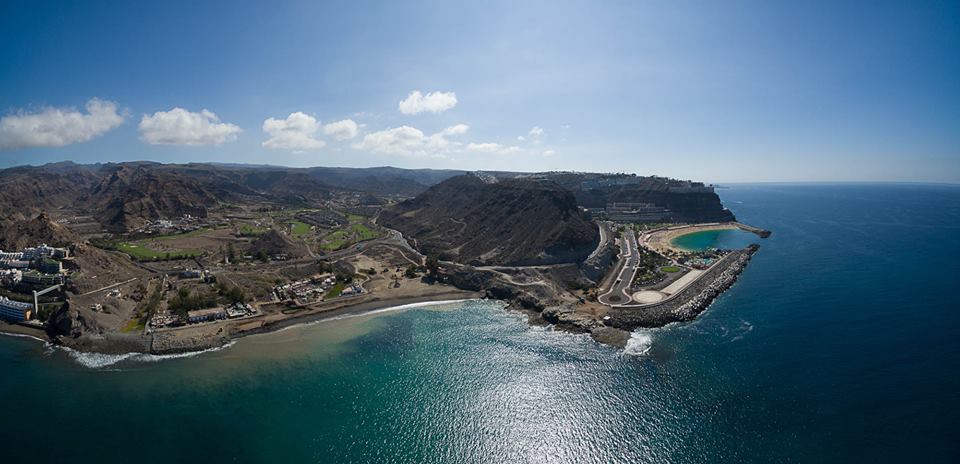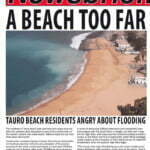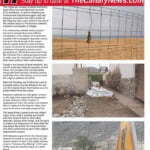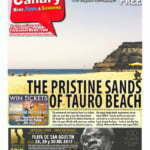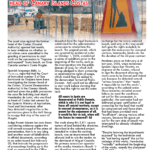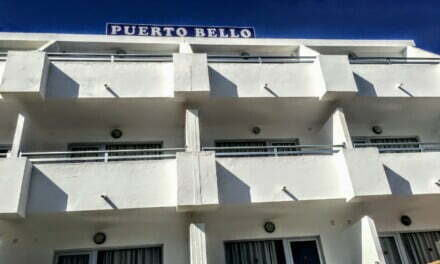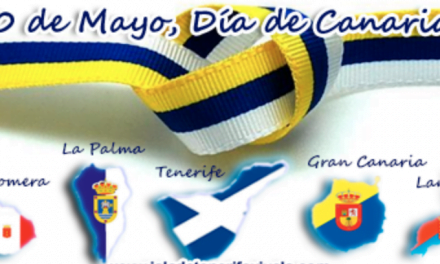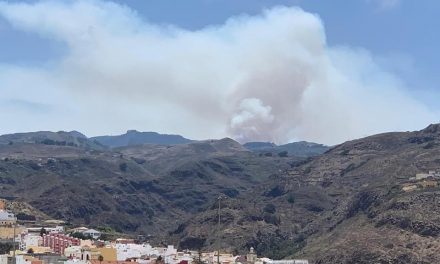A little-known beach on the south west of Gran Canaria has been making big waves, again, following more than 30 years of talk, 20 years of hype, 16 years of planning procedures and 6 years of controversy in the hands of the recently bankrupted Grupo Santana Cazorla. It appears the long awaited Tauro Beach project has finally been cancelled, after years of intrigue, investigations, recriminations and shifting sands. Well, cancelled for now, at least.
A correction was made to this article on April 6, as detailed at the end
The Special Territorial Plan of the Litoral de Tauro (PTE-29) was finally approved back in 2014, by the Cabildo de Gran Canaria, 8 years after being initially put forward to regulate a long-touted tourism development, including a new artificial beach project, that had been promoted by a timeshare company, the Anfi Group, as early as 2001. The beach development was to be complemented by a 322-berth sports marina and a new shopping and leisure area, as well as up to 7,500 tourist beds in the Tauro valley, expected to rejuvenate and improve the tourism offering on the Costa Mogán, bringing prestige, jobs and new riches to the popular tourist destination.
The beaming CEO of Grupo Anfi, José Luis Trujillo, said, after many years of waiting, regulatory reformulations and bureaucratic pitfalls, and having won the contest against Puerto Rico SA for the concessions to run the businesses on this new beach, “Anfi’s dream continues with the construction of a beach that will be a benchmark for leisure on Gran Canaria” pointing out that the beginnings of this planning project had first been put forward back in November of 1987.
– Tauro Beach and Amadores in the now defunct plan
 – David Silva, Trujillo and Bueno shovel sand on Tauro Beach July 2015
– David Silva, Trujillo and Bueno shovel sand on Tauro Beach July 2015
This helpful distraction diverted much attention from the Anfi Group’s recent change of fortunes, in January 2015 following a supreme court ruling, the first of many, against Anfi, among others, on mis-sold timeshare. The judgement opened the company up to huge numbers of potential claims for selling illegal contracts valued, by some insiders, in the tens of millions or possibly more. In the time since Anfi’s financial liabilities have grown and grown, simply due to being judged to have wilfully and repeatedly ignored the rules and the law. It attracted the attention of other more political animals in the area.
There were lots of reasons for caution, particularly after such a long journey to achieve administrative consent for such a big project. None of this, however, stopped Mogán’s mayor, Bueno, newly elected just over a month before, from immediately getting in on the action, heralding the project as good for Mogán “a beach that will serve to attract more tourists to the municipality” wasting no time in joining the July 2015 photo-opportunity to shovel sand, alongside local-born international football star David Silva, finally breaking ground on the development, and giving the project her new administration’s seal of approval. Fences were erected and heavy machinery brought in to start work in early 2016.
 – Tauro Beach as heavy machinery moved in before the sand arrived in 2016
– Tauro Beach as heavy machinery moved in before the sand arrived in 2016
Sandcastles in the sky
More than 50 legal objections had been made to the plans, from various quarters, claiming a total lack of consultation, inadequate permissions from property owners, deficient environmental impact studies and a raft of other complaints, including allegations from almost all of the local residents who would be directly affected, many of whom have lived on the shoreline of the Tauro bay for decades.
The final go-ahead to begin came from the Canary Islands head of Costas (regional coastal authority), José María Hernández de León, himself; and 70,000 tons of desert sand was hurriedly extracted, illegally, from the nearby disputed territory of Western Sahara then dumped on to what had been up to that point a pebble beach. The project, now underway, it was announced with much publicity, would be finished by Christmas 2016 at a cost of €2.5m. The Mogán mayoress told journalists that the residents of Tauro beach would have to leave.
 – The tide takes the sands from Tauro Beach
– The tide takes the sands from Tauro Beach
No sooner had work begun, however, than cracks appeared in the execution of this long awaited flagship project. Local mariners, who understand the tides on that coastline, were dubious about how long the sands would last. For the first time in living memory, the sea flooded in over the freshly landscaped beach to inundate the homes of residents, most of whom could ill afford such a disastrous occurrence, and some of whom felt intimidated by the sudden failure of the shoreline. The project was halted pending further engineering studies and environmental reports. The Green Party claimed irrevocable damage to a protected habitat. The Canary Islands head of the Costas was removed from his post and then arrested by the Guardia Civil, charged with falsification of documents, and having lied about failures in his duty, when it was discovered he had failed to verify the required property rights prior to ordering the project to proceed.
 – Tauro Beach and ignored barriers
– Tauro Beach and ignored barriers
In frustration, locals tore holes in the fences so as to be able to access the now modified shoreline. Court action was initiated to remove Anfi’s permissions and concessions, while they scrambled to try to gain the missing property permissions to continue the development. Mogán town hall refused to police the coastal strip of land, or remove bathers from the beach, making clear that it was Anfi’s responsibility now, as was the destruction of their fences by members of the public trying to reach the sea.
13 shacks, which several people had made their homes, were questionably and brutally torn down by the infamous Catalan evictions company, thought to be neoconservative leaning (though who say they are a-political), whose skin-headed, musclebound “businessmen” claim to be “experts in mediation”, using a gang of thugs and a JCB, about which Mogan town hall claimed, despite having had to give permission for such action, no real knowledge, as they weren’t present, mayoress Bueno declaring that the Town Council “has nothing to do with this matter.”
The list goes on and on. These and many more reasons for caution when dealing with institutions and entities who display little observance of State planning laws, or ordinary people’s fundamental rights. People for whom power and money and nepotism, and even suspected fraud and corruption on a grand scale, consistently seem to trump any considerations for the everyday norms that are in place to regulate business and urban developments and to protect individuals from being harmed by large corporate and political interests.
As the situation, and the confusion, has worsened for the Tauro project, so our good lady mayor and her administration have announced that they will be taking over this newly sandy beach at the mouth of the Tauro valley. Similarly they have refused to renew the long-standing concessions for the Puerto Rico beach and for Amadores beach, claiming administration of these facilities as revenue generating assets for the town hall of Mogan.
If one were to have a suspicious mind, one might suspect some sort of subterfuge in this latest blow to the private investment projects of Mogan. But of course that would be cynical. Surely it will only be the good people of Mogan who will, in the end, profit from these shifting sands. Right?
Back to the drawing board
 For now, though, it seems that all is quiet again on the pristine sands of Tauro beach. The territorial plan, PTE-29, providing the framework for the project was declared null and void in March 2019. And news has come this first weekend in April that the Spanish Supreme Court will not allow any of the appeals presented by the Cabildo and the Government of the Canary Islands against the sentence handed down by the Superior Court of Justice for the Canary Islands (TSJC) due to non-compliance with Coastal Law, specifically due to the absence of a mandatory and binding report from that Coastal Authorities which would have been needed before it had gained final approved in 2014.
For now, though, it seems that all is quiet again on the pristine sands of Tauro beach. The territorial plan, PTE-29, providing the framework for the project was declared null and void in March 2019. And news has come this first weekend in April that the Spanish Supreme Court will not allow any of the appeals presented by the Cabildo and the Government of the Canary Islands against the sentence handed down by the Superior Court of Justice for the Canary Islands (TSJC) due to non-compliance with Coastal Law, specifically due to the absence of a mandatory and binding report from that Coastal Authorities which would have been needed before it had gained final approved in 2014.
The order not only concludes that “the remedies prepared have no interest in cassation”, that is to say that the substance of the appeals contain no new evidence that might lead the Supreme court to either reconsider the verdict, nor re-interpret the existing tenets of applicable law, but also orders the appellants (those filing the appeals) to pay the costs, as they had alleged in their appeals that the breach of the Coastal Law (Spain’s Ley de Costas regulating protection, use and policy of the maritime-terrestrial public domain, in particular the maritime shore) had not been expressly raised by the company that had originally appealed approval of the Plan, Puerto Rico SA.
The 2014 territorial coastal plan for Tauro, in Mogán, which was annulled by the TSJC in March 2019, had authorised the construction of a marina with 322 moorings, the regeneration of the beaches at Tauro and El Cura and the creation of a promenade along that strip of shoreline that would be paid for with a private investment estimated to be in excess of €31 million. The marina planned in Tauro, was initially to be built between that beach and the El Cura beach (Playa del Cura), but the plan had, in the end, changed the position of the marina to the other side of Playa de Tauro, against the cliff that separates it from Amadores beach. The Plan, now void, also contemplated the implementation of a hammock and umbrella service on both beaches and the creation of a promenade that would link these two beaches with Amadores.
Bankruptcy of Santana Cazorla
 Meanwhile, in recent weeks, in a separate court judgment investigating the business dealings of the Hermanos Santana Cazorla SL (HSC) the company has been pronounced completely bankrupt. After years of ducking and diving, wrangling and wriggling, the courts have concluded that this well-known island construction, development, promotion and investment company cannot possibly service their debts, due to a negative operating capital exceeding €72m.
Meanwhile, in recent weeks, in a separate court judgment investigating the business dealings of the Hermanos Santana Cazorla SL (HSC) the company has been pronounced completely bankrupt. After years of ducking and diving, wrangling and wriggling, the courts have concluded that this well-known island construction, development, promotion and investment company cannot possibly service their debts, due to a negative operating capital exceeding €72m.
Last week the family-run company whose portfolio of investments and subsidiaries stretched across many business areas from Hotels, to a multi-award-winning winery, various construction companies, and numerous other interests across Gran Canaria, these islands and elsewhere, has seemingly been put out of business. However we are told that the woes of HSC do not affect the entire Santana Cazorla Group, which is diverse.
**On March 31 Anfi CEO, Jose Luis Trujillo, sent a letter to all of their timeshare “owners” and clients, known now as “members” to explain that HSC SL are not the specific company who own 50% of Anfi resorts (the other half owned by rivals Lopesan Hotels) but in fact this major share of the timeshare group, with a “golden vote”, is owned by a completely separate company who, the letter says, is not a subsidiary of HSC and therefore is totally unconnected to the dealings with Anfi.
Specifically, the judge suspended the companies 959 Oliva Inversión Internacional SL; 947 MSC Inversión Internacional SL; Santana Cazorla Servicios SL, and Bodegas Tirajana SL.
HSC was operated by the Santana Cazorla brothers, whose children, and other family members, do involve themselves in various aspects of the group of companies, whose interests spread far and wide across the islands. Although Santana Cazorla were the developers who provided machinery and workers for the transformation of the now defunct Anfi Tauro Beach, Trujillo makes clear in his letter that HSC’s bankruptcy is unlikely to have any serious repercussions for Anfi, themselves.
And we have no reason to doubt him.
Altogether this looks like the end of the road for the Tauro Beach project, for now at least, with several years likely to elapse before anyone tries a further plan on this scale. But in a municipality like Mogán, where huge urban projects are sometimes green lighted, seemingly without warning, or consultation, it really is anyone’s guess as to what might just happen next.
What is clear is that citizens of Spain have a constitutional right to access all coasts, which are in the public domain. One important question will now start to be asked in earnest, particularly by the residents of Playa de Tauro, and that is when will the fences be removed again, and when will the people of Mogán regain their right to access their beach once more?
The founders of Puerto Rico de Gran Canaria & Tourism in Mogán
Puerto Rico SA have been operating for more than 50 years on the south of the island, under the auspices of the Roca family, who literally founded Puerto Rico de Gran Canaria in 1968, having purchased the entire valley two years earlier, for the meagre sum of 30m pesetas. The Barranco de Puerto Rico was part of a huge estate farm, some estimate 8 million m2, stretching 12km inland and another 2km to the west), and on the cliffs either side of the valley was constructed the tourist resort town we know today. The resort peaked at 20,000 tourist beds, however a large number of those apartments were subsequently sold to private buyers who chose to live in them, able to take advantage of a town hall who seemed happy to turn a blind eye to the existing laws around residential use of tourist property, the land it is built on and the licenses under which it operates. The current mayor expressed her displeasure, in 2015, at tourist beds not being used for tourism, however after a long controversy, the Canary Islands Government stepped in to regularise those who had bought in good faith, while making clear new procedures for change of use in the future.
The four Roca brothers, who had done very well out of construction in the early 60s tourism boom in Maspalomas, and whose father was a well known realtor, started work on Puerto Rico in 1966. By 1972 they were constructing the very first artificial beach in Spain, which in turn kick started tourism in the area.
Mogán prior to that was an agricultural zone, peopled by simple folk, with dirt roads and a small fishing fleet. They say the town hall still had an earthen floor. Any visitors who came, headed to Playa de Mogán, and due to their free loving, smoke hazed ways, were known as Los Hippies. The Roca clan and their descendants did so well from the concessions to operate tourism infrastructure, and from urbanising the Puerto Rico valley, selling plots for tourism development, and promoting the building of “Shopping Center Puerto Rico”, that in 1986 they were able to construct Gran Canaria’s second artificial beach at Amadores. Those whose families had always held power in the area must have looked on with green eyes at these incoming businessmen with fresh ideas and the ability to attract capital. They welcomed them with open arms, and Mogán propspered.
The town hall’s recent decisions to refuse support for their concession renewal applications, may feel like a slap in the face after so long, but running tourist beaches is big business round these parts, with a lot of potential benefits, and this administration has never been backwards about going forwards when it comes to grabbing revenues and awarding contracts to businesses they take a shine to. Will Puerto Rico SA recover, yes, most certainly. Will they try again, for sure, they have lasted longer than most operators on the coast of Gran Canaria’s wild south west, and certainly they are tenacious enough to take on the dynastic political families who tend, by hook or by crook, to gain control of this local council.
Even with the best will in the world, even mayors are somewhat limited to the 4-yearly electoral cycle. Somewhat. Let’s see if we don’t find a Roca on the ballot in 2023… or perhaps sufficient divisions will remain to keep the same old faces on the same old lamp posts and billboards, serving up more of the same for a fist full of dollars and few years more.
 The mayor, Bueno, has kept a very low profile in recent days, having spent months trying to distract the world with her “humanitarian efforts” to remove irregular migrants from the Port of Arguineguin, she moved on to marching through the streets with anti-immigration protesters.
The mayor, Bueno, has kept a very low profile in recent days, having spent months trying to distract the world with her “humanitarian efforts” to remove irregular migrants from the Port of Arguineguin, she moved on to marching through the streets with anti-immigration protesters.
Subsequently she has made loud, if meaningless, noises regarding her opposition empty hotels temporarily accommodating migrants, reading well the rightist rhetoric, stirred initially by fishermen afraid of Covid infections, then others with time on their hands, to join the cries to “Save Tourism” by moving these people out of her municipality, she has even tried to fine those hoteliers who aided the humanitarian effort, while detention camps were being constructed into which to move the migrants.
Now that all but a handful of migrants remain in Mogán, along with a couple of hundred unaccompanied minors, accommodated in the municipality’s (still empty) hotels, and while a further influx (of either visitors or migrants) is awaited, presumably tourism has now been saved. Bueno will no doubt return to other more pressing matters, such as jetting off to meet with her Madrid legal team, to prepare a defence for her upcoming court appearances to answer many niggling doubts that have arisen about her administration’s management of municipal affairs, and indeed how it was they came to office in the first place.
Various concerning questions have certainly emerged, both before and during her tenure in the town hall, regarding the methods with which she and her party serve the good people of Mogán.
Not least of all the fact that she has been under investigation for many years, this time round since at least 2015, over very serious allegations of fraud, nepotism, irregularly awarded contracts, urban planning concerns and various alleged electoral irregularities.
She faces trial, likely this year, following a very public arrest by Guardia Civil last September, along with two of her councillors, which she responded to by concentrating on international migration, and alleging a massive state conspiracy against her. Without a doubt she is bare faced and tireless. We wish her well. Qué Bueno.
**An error in this article, published April 5, was corrected after it came to our attention that the bankrupt company Hermanos Santana Cazorla had been incorrectly stated to be a shareholder in the timeshare operators Anfi Group. A letter signed by Anfi CEO Jose Luis Trujillo, made clear to Anfi members that there was no reason to be concerned with regards to the bankruptcy as HSC, though part of the same family of companies, was not in actual fact the company that owns a 5o% shareholding in Anfi.
If you spot any errors in our reporting please do not hesitate to contact us by email, or through our Contact page, or by calling +34 928 987 988
Bulo in Paradise: The Tauro Beach SagaThe Ballad of Tauro Beach:...Posted by The Canary News on Thursday, April 8, 2021

